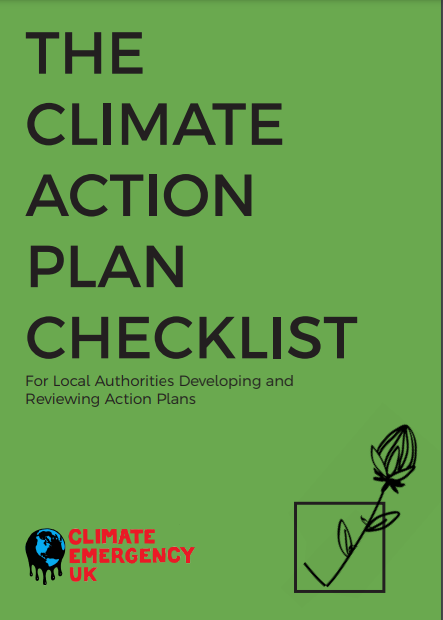The Climate Action Plan Checklist for local authorities developing and reviewing action plans.
The Climate Action Plan Checklist: For Local Authorities Developing and Reviewing Action Plans

Whether we have a chance of limiting global warming to 1.5°C will depend on what happens between now and 2030. 83% of UK local authorities have recognised the severity of the crisis by declaring a climate emergency. Most have recognised the urgency of the situation by setting ambitious targets and/or developing climate action plans. The next step is to turn these declarations, targets, and plans into effective action. Local authorities can use this Checklist to draw up ambitious, comprehensive and robust Climate & Ecological Emergency Action Plans, while community groups can use it to assess the ambition of their local authorities’ plan.
Action at the local level is essential to tackling the climate and ecological emergencies. The Climate Change Committee, in their Local Authorities and the Sixth Carbon Budget report, stated that “More than half of the emissions cuts needed rely on people and businesses taking up low-carbon solutions – decisions that are made at a local and individual level. Many of these decisions depend on having supporting infrastructure and systems in place. Local authorities have powers or influence over roughly a third of emissions in their local areas.“
Local authorities can drive reductions in emissions across their whole area. This is because of their unique insight into, and their relationship with, local communities; their service delivery and regulatory functions; and their power to convene others. Of all the actions in this Checklist there is one that underpins how successful a local authority will be in reducing emissions:
The Action Plan should commit the local authority to include the climate emergency in all local authority decisions and actions.
In reducing emissions, local authorities will deliver many co-benefits for their communities. Increasing resilience to climate change can also reduce costs from extreme weather incidents. Human health and wellbeing are dependent on a healthy planet; the Covid-19 pandemic has clearly demonstrated this. National and local recovery plans will play a key role in delivering a green and fair recovery – joining up action on climate, nature, health, and prosperity. Plans can also help address environmental inequalities. BAME and poorer communities experience worse air pollution, less access to green space, and are less able to respond to extreme weather caused by climate change.
There is strong public support for local, place-based action. 66% of Britons believe that climate change is as serious as Covid-19. The majority also want to see climate action prioritised in the economic recovery. The UK Climate Assembly concluded that there should not be a ‘one size fits all’ approach to important issues such as transport and housing communities. Communities must be able to shape solutions to the climate crisis and take the lead in doing so. Tackling the climate crisis will impact people’s lives and change their lifestyles. Local authorities must involve local residents, businesses, community organisations, and service providers in the development of the Action Plan.
